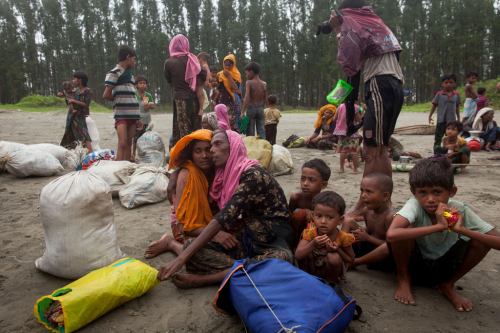UN-supported campaign to immunize 150,000 Rohingya children against deadly diseases
As thousands of Rohingya refugees – including many children – having fled violence in Myanmar continue to arrive in Bangladesh, a United Nations-supported vaccination campaign has been initiated to prevent the spread of potentially deadly diseases.

Newly arrived Rohingya refugees sit at Shamlapur beach in Cox's Bazar district, Bangladesh, after traveling for five hours in a boat across the open waters of the Bay of Bengal.
According to a news release by the UN Children's Fund (UNICEF), the agency and the UN World Health Organization (WHO) are supporting the Bangladeshi Ministry of Health-led campaign targeting measles, rubella and polio to inoculate some 150,000 Rohingya children below the age of fifteen in 68 refugee settlements near the country's border with Myanmar.
“We are happy that we were able to initiate the immunization campaign so quickly to protect the population from a possible measles outbreak” said Navaratnasamy Paranietharan, the head of WHO in Bangladesh.
The seven-day campaign was planned by the UN health agency, which is also managing and monitoring its field implementation. UNICEF has provided vaccines, syringes and Vitamin A capsules.
“Measles is a very infectious and dangerous disease during emergencies, especially for children who are already weak and malnourished,” added Edouard Beigbeder, the head of UNICEF in Bangladesh.
“With thousands of children crossing the border every day, vaccination is crucial to prevent the spread of potentially deadly diseases.”
According to a news release by the UN Children's Fund (UNICEF), the agency and the UN World Health Organization (WHO) are supporting the Bangladeshi Ministry of Health-led campaign targeting measles, rubella and polio to inoculate some 150,000 Rohingya children below the age of fifteen in 68 refugee settlements near the country's border with Myanmar.
“We are happy that we were able to initiate the immunization campaign so quickly to protect the population from a possible measles outbreak” said Navaratnasamy Paranietharan, the head of WHO in Bangladesh.
The seven-day campaign was planned by the UN health agency, which is also managing and monitoring its field implementation. UNICEF has provided vaccines, syringes and Vitamin A capsules.
“Measles is a very infectious and dangerous disease during emergencies, especially for children who are already weak and malnourished,” added Edouard Beigbeder, the head of UNICEF in Bangladesh.
“With thousands of children crossing the border every day, vaccination is crucial to prevent the spread of potentially deadly diseases.”
Source:United Nations
- 301 reads
Human Rights
Ringing FOWPAL’s Peace Bell for the World:Nobel Peace Prize Laureates’ Visions and Actions

Protecting the World’s Cultural Diversity for a Sustainable Future

The Peace Bell Resonates at the 27th Eurasian Economic Summit

Declaration of World Day of the Power of Hope Endorsed by People in 158 Nations

Puppet Show I International Friendship Day 2020

